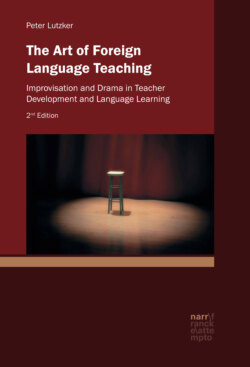Читать книгу The Art of Foreign Language Teaching - Peter Lutzker - Страница 40
На сайте Литреса книга снята с продажи.
3.1 The Concept of the English Week
ОглавлениеIn the annual invitation sent out to Steiner Schools there is always a short paragraph taken from the invitation to the first English Week which briefly describes the underlying concept of the whole course. The following excerpt is taken verbatim from the invitation to English Week 2006:
The idea of an English Week was born ten years ago out of our conviction that intensive artistic work with actors, directors, storytellers and clowns, would be of immeasurable benefit for foreign language teachers. The experiences and feedback that we’ve had from the last nine years of working with outstanding professionals like Vivian Gladwell, Robert McNeer, Tessa Westlake, David Campbell and Duncan Macintosh have proved to be a resounding confirmation of this concept. Thus, the daily three-hour dramatic workshops continue to remain a keystone of the entire English Week. As in previous years, there will be morning lectures based on the general conference theme and in the afternoons there will continue to be a wide variety of working groups addressing different methodological issues and questions. The evenings are full of the “Spirit of English” in the forms of lectures, songs and dances. Another tradition we have maintained has been to encourage an open exchange with leading authorities in foreign language teaching outside of Waldorf circles. Our guests in the past have included Prof. Hans Hunfeld, Prof. Hans Eberhard Piepho, Prof. Werner Bleyhl, Prof. Alan Maley, and Mario Rinvolucri (three times).
The program of the English Week 2005 gives a clear picture of its basic structure during the time in which this study was conducted.193
The schedule gives a clear picture of the day’s activities beginning at 8.15 in the morning with singing and ending late in the evening with English folk dancing. Even within the context of a very full program, it is clear that the drama workshops have a unique status in regard to their place in the timetable and with respect to their length.
Although in the context of this study, the focus will be on one of the drama courses which, as it is written in the invitation, we have always considered to be “the keystone of the entire English Week” it is essential to realize that these courses have always been offered within the general context of a conference theme and framework which is closely tied to the principles of artistic work. Both the lectures as well as the afternoon methodology courses have generally attempted to draw upon and integrate the participants’ experiences in the drama workshops into their own frameworks. Thus, each element of the program including the other artistic activities (choir singing and English folk dancing) can be seen to address related aspects of teaching and learning albeit in a very different context and form. This coherence can be viewed as an essential element of the entire week, exemplifying the common vision of artistry in teaching which we as the organizers have continued to share.
Although this study will focus specifically on the clowning course, it will be instructive to give a brief overview of the other artistic courses and then describe one of them in more detail, in order to give a fuller picture of the underlying concept as well as to put the clowning course into a larger context.
